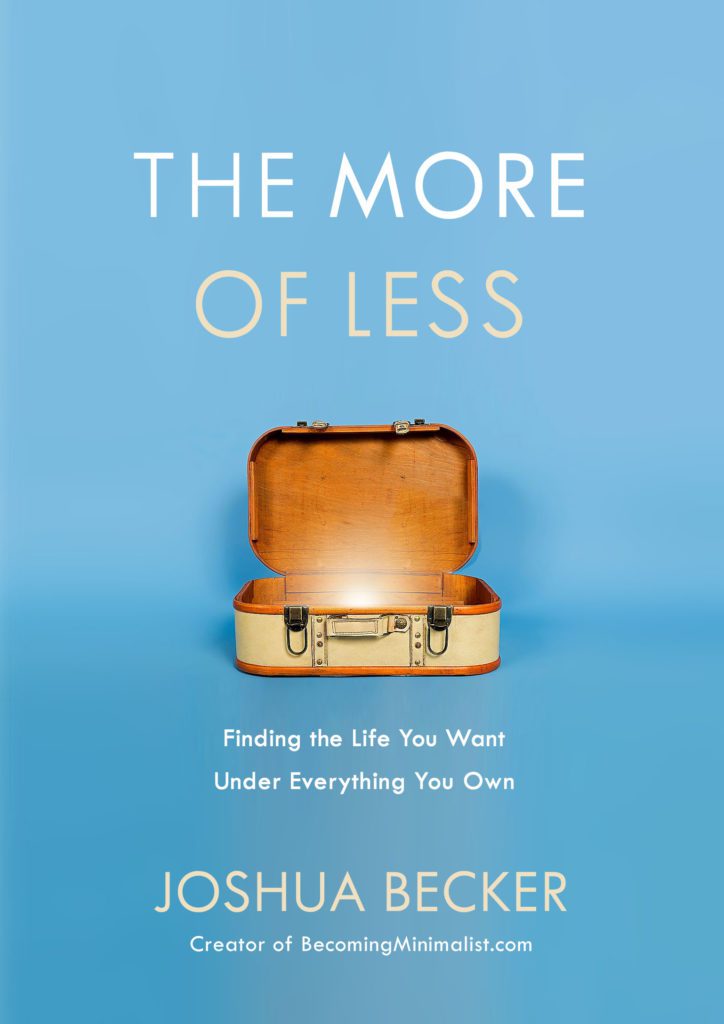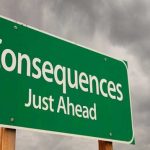The more stuff you own, the more your stuff owns you.
Blogger Joshua Becker shares strategies, tools, and insights for becoming minimalist. In the more of less, he offers a plan for living more by owning less. Joshua writes “Not only are my possessions not bringing happiness into my life; even worse, they are actually distracting me from the things that do!”
“Minimalism is the intentional promotion of the things we most value and the removal of anything that distracts us from them. It’s for everyone who wants more out of less.”
Favourite Take-Aways: The More of Less by Joshua Becker
Our excessive possessions are not making us happy. Even worse, they are taking us away from the things that do. Once we let go of the things that don’t matter, we are free to pursue all the things that really do matter.
“Too many people spend money they haven’t earned to buy things they don’t want to impress people they don’t like.” – Will Rogers
Minimalism is not necessarily the same as frugality. It is a philosophy recognizing that owning more stuff is not better; owning better stuff is better. Getting rid of what you don’t need is the first step toward crafting the life you want.
Benefits of Minimalism
“When we embrace minimalism, we are immediately freed to pursue our greatest passions.”
Living with less offers more time to spend on meaningful activities, more freedom to travel, more clarity in our spiritual pursuits, increased mental capacity to solve our most heartfelt problems, healthier finances to support causes we believe in, and greater flexibility to pursue the careers we most desire.
“MINIMALISM: the intentional promotion of the things we most value and the removal of anything that distracts us from them”
The beauty of minimalism isn’t in what it takes away. The beauty and the full potential of minimalism lie in what it gives. Minimalism is about what it gives, not what it takes away. It’s the intentional promotion of the things we most value and the removal of anything that distracts us from them. It’s a new way of living that fills us with hope.
“The goal of minimalism, is not just to own less stuff. The goal of minimalism is to unburden our lives so we can accomplish more.”
The Fog of Consumerism
The key to overcoming our consumeristic tendencies is to deliberately peer into our blind spot and see what we have been ignoring. We have to measure the magnitude of consumeristic propaganda and observe how thoroughly it permeates public discourse and our own personal outlook. We must also admit we have been influenced by it. For only then can we take a stand against consumerism’s effects on our lives.
To make resisting consumerism even harder, some of the finest minds in our generation use every tool they can devise to craft us into even greedier consumers. Purchasing new things has never been easier — as simple as clicking a single button.
Success and excess are not the same.
Possession of riches is often arbitrary. Sometimes people achieve financial gain through hard work and dedication. But not always. Sometimes financial wealth is a result of heritage, dishonesty, or just plain luck. In those cases, the rich have earned no praise for their wealth.
Our world checks the wrong scoreboard. Those who live in excess are not necessarily the ones who have the most fulfilled lives. Often it is those who live quietly, modestly, and contentedly with a simple life who are the happiest. Those are the choices we should be celebrating and the lives we should be emulating. Yet this definition of success is foreign to most of us.
“Consumerism is pervasive in our culture. We have to train our eyes to see it in operation. Because then we can resist its destructive allure.”
SURRENDERING THE GOLDEN FORTRESS
In our society, too many of us believe security can be adequately found in the personal ownership of possessions. Of course there is a grain of truth in that belief. Certainly, food and water, clothing and shelter are essential for survival. But the list of possessions that we truly need for life is quite short, and most of us already have those things.
The reality is, we have too quickly confused needs with wants and security with comfort. As a result, many of us collect large stockpiles of possessions in the name of security when we are actually accumulating comfort (or desired pleasure). We work long hours to purchase these things. And we construct bigger and bigger houses to store them.
We dream of a future that includes larger paychecks and sizable savings accounts. We plot and plan to acquire them because we think they provide lasting security. If that costs us in other areas of life, such as our family and friendships, then that’s the way it goes. The source of security seems so important that we can’t give up our pursuit of more.
Contentment
We all want to feel like we’ve arrived. Like we’ve got all we want and are satisfied. We all want to reach the land called Contentment.
People look for contentment in all sorts of places. Some look for it in a high-paying job and yet are discontent the first time they are passed over for a raise. Some look for it in a large home and yet are discontent every time it needs improvements or maintenance. Many have sought contentment in a department store, believing one more item will finally fulfill them, yet when they get home with their purchase, they still feel like something is missing.
Clutter
With all things in life, it is important not to confuse a desire to change with actual change. Thinking about decluttering or talking about decluttering won’t result in any positive benefits. You can experience these benefits only when you have actually removed the excess clutter. Remind yourself today that talking about change is not the same as implementing change. And take one small step in the right direction because of it.
“Clutter is a visual sign of…procrastination, and carries with it just as much anxiety” – Leo Babauta
Unpaid bills, unread newspapers, unsorted mail, and unfinished work projects clutter our counters and desks and clamor for our attention. Each time we walk past stacks of paper, our minds are distracted from the present motivation in our lives. For this reason, it is important to remove as much clutter as possible from our field of vision and focus on whatever’s more important to us.
Minimalism Experimentation
Experimentation is a powerful tool you can use in developing your own expression of minimalism. The idea is simple: if you aren’t sure you want to get rid of something, live without it for a while and then decide whether it’s necessary to you or superfluous.
It’s a way of testing your assumptions about how much you need. In my experience, it often proves that we don’t need as much as we think.”This helps them make up their minds and push through the difficult phases of minimizing. But beyond that, minimalism experimentation is a skill that we can use for the rest of our lives. It’s like a sensitive gauge that fine-tunes our practice of minimalism.
The parameters of such an experiment are simple and adaptable.
Experiment: I will live without ___________ (possessions) for ___________ days (or weeks or months).
At the end of that time I will decide either
[ ] Yes, I can live without those possessions.
[ ] No, I still need them.
Based on my decision, I will either get rid of those possessions permanently and not miss them, or I will integrate them back into my life and feel comfortable with that choice.
Watch less Television
Television is like a one-eyed Svengali hypnotizing its viewers into doing what it wants. Through its frequent commercials, it relentlessly tries to persuade us to buy things we don’t need. Through many of its programs, it glamorizes wealth and lavish lifestyles. Other forms of media, such as online ads, entice us to overspend as well. We have to turn our gaze away from this unblinking eye we’ve invited into our homes.
Television is a self-propagating habit. It promotes its own interests by boldly declaring the Best New Show, the Most Watched Network, the Can’t Miss Episode, or the Game of the Year. TV’s advertisers routinely play on our fear of missing out by telling us, “Everyone is watching!” But as you commit to watching less, you will be less persuaded by these claims because you will see them less often. Quickly you will realize that you aren’t really missing much.
Watching less television just may be your quickest shortcut to better living right away.
The Unexamined Life
This is what makes the unexamined life so dangerous. We think we are living life to the fullest but we aren’t. Instead, we are often trading long-term purpose for short-term pleasure.
When we eat unhealthily, we miss an opportunity to fuel our bodies properly.
When we watch too much TV or spend too much time online, we miss opportunities to interact with people in the real world.
When we neglect to exercise, we miss the opportunity to enjoy the kinds of adventures available to those with physical stamina.
When we stay up late and sleep through the morning, we may be missing out on the most productive period of our day.
When we buy more than we need, we miss the opportunity to live free and unburdened.
When we spend more than we earn, we shackle ourselves with bondage to debt.
When we spend too much money on ourselves, we miss the opportunity to find greater joy by being generous to others.
The way to avoid these kinds of mistakes is to live intentionally. That is, we examine our options and make choices with larger purposes and longer-term goals in mind. If an activity, a decision, or a habit is not bringing us closer to our purpose and passion, then we should remove it. Because most of the time it is only distracting us from what really matters.
THOROUGHLY MINIMALIST
In your schedule…bring your busyness down to a healthy level, and focus on activities that matter the most to you.
In your body care…don’t go overboard in trying to make yourself look good to others, but instead try to keep your body fit and capable for the purposes you hope to fulfill.
In your relationships…let go of unhealthy or unfruitful connections, if necessary, but keep up the ones that are important to you, even if sometimes the benefits to you aren’t obvious.
Those who experience the greatest joy are the ones who seek to implement wise and healthy habits in all aspects of their being. Because when they do, they are equipped to accomplish more with their lives than they ever imagined.
All the Best in your quest to get Better. Don’t Settle: Live with Passion.



1 Comment
Pingback: 100 Books Reading Challenge 2021 – Lanre Dahunsi